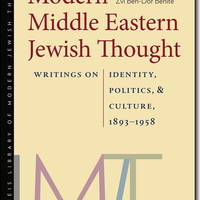Geneologies [plus] by Moshe Behar
Brandeis Library of Jewish Thought by Moshe Behar
Articles by Moshe Behar
In memory of Sami Michael [1926-2024], 2013
"Sami Michael," in Modern Middle Eastern Jewish Thought: Writings on Identity, Politics, and Cult... more "Sami Michael," in Modern Middle Eastern Jewish Thought: Writings on Identity, Politics, and Culture, 1893–1958 (2013), pp 241-247.
Friday, 22 March 2024, 11am Lisbon // 1pm Jerusalem
Click below for Remote/Zoom participation
Radio Interviews Palestine/Israel (Oct 2023), 2023
Radio interviews on Palestine/Israel, Oct 2023. Needless to add that they all correspond to devel... more Radio interviews on Palestine/Israel, Oct 2023. Needless to add that they all correspond to developments up to each date. Feel free to forward/utilise further.
Soundings: A Journal of Politics and Culture, 2022
Moshe Behar, "Entanglements: the IHRA, Jews and non-White Minorities," Soundings: A Journal of Po... more Moshe Behar, "Entanglements: the IHRA, Jews and non-White Minorities," Soundings: A Journal of Politics and Culture, (Vol. 80, 2022), pp. 82-96. [full text]
Contending Modernities, 2021
Contending Modernities, 2021
Contending Modernities, 2020
Source: Notes in the History of Art, 2019

The question was simple: should the Hebraist Zionist movement in Ottoman Palestine invest in publ... more The question was simple: should the Hebraist Zionist movement in Ottoman Palestine invest in publishing a newspaper in Arabic and, if yes, should it be communitarian Jewish or general in its topics? What began as yet another obscure intra-Zionist deliberation gradually crystallized into what I argue merits the label of the earliest, explicitly Ashkenazi–Mizrahi ethnic controversy. This is with the smallest risk of the superimposition in hindsight of the terms and signifiers usually associated with Israel’s post-1971/Black-Panthers era onto the Ottoman period. Lasting between 1909 and 1913, the spirited exchange regarding the Arabic newspaper involved two dozen writers, mainly of the Sephardi–Mizrahi Haherut newspaper, and about one third of ethnic Ashkenazim writing elsewhere. It was nonetheless October 1911 that encapsulated the peak of the controversy, mainly due to writing by Mizrahi intellectual and activist Dr Shimon Moyal (1866–1915) and Ashkenazi intellectual and activist Dr Avraham Ludvipol (1865–1921). My decision to let primary texts speak for themselves at greater length than is customary results from my conviction that – in this case – extensive recourse to source material can convey best to twenty-first-century readers why the exchange is effectively “the mother” of all ensuing Mizrahi–Ashkenazi ethnic controversies. While clear definition for what constitutes such a controversy is provided, I close by offering a sample of views about the Arabic newspaper by four prominent Ashkenazi Zionists.

Caged in a minuscule china-store are a cat, a dog and an elephant. Their lives are fraught with t... more Caged in a minuscule china-store are a cat, a dog and an elephant. Their lives are fraught with tensions, hazards, and risks. As a consequence, the cat and the dog engage each other to debate the situation and devise paths to secure dignified life for all. Their exchanges are scrutinized also by observers who split every hair to four to weigh prospects for a functioning coexistence. Notwithstanding his dominance over the store, the elephant and his reasoning are rarely considered thoroughly. This, I submit, metaphorizes the post-1993 One-State/Two-States debate on Palestine/Israel. Whereas the neglected elephant in the china-store is Israel’s ruling Zionist Right – the cat and dog represent the non-Zionist One-State school and the left-Zionist Two-State school who ‘own’ the 1S2S debate. In what follows two complementary propositions are explained. The first is that there never really was a consequential pre-1948 Zionist constituency – nor a post-1948 Israeli-Jewish constituency – that supported a Two-State partition in the Lilliputian 26,320 km2 territory comprising Mandatory Palestine from the Jordan Valley to the Mediterranean Sea. Anti-partition was certainly the historical Palestinian stand as well. The second proposition is concurrent: the breathtaking One-State vision for this territory—in its dominant forms of a liberal or bi-national state—seems equally unlikely to materialize. Standard 1S2S solutions appear remote because the sole empirical/material process that does unfold in this territory since 1919 is what I term Israel's One-State Solution, i.e., ceaseless consolidation of Zionist-Israeli domination over the whole territory comprising mandatory Palestine.

[...] Of the innumerable quandaries emerging as a consequence, one concerns me here: can—and shou... more [...] Of the innumerable quandaries emerging as a consequence, one concerns me here: can—and should—“Flora Saporto” be regarded by the scholarly community as the earliest protofeminist Mizrahi story in Modern Hebrew, as was argued before the author's identity and ethnicity were revealed? Since some scholars, and activists, have answered in the negative, the rest of this essay consists of two parts. The first part includes the first translation into English of about half of “Flora Saporto.” I then substantiate the following proposition: while ethnic, gender, or racial origins of authors are undeniably indispensable for making full sense of literary development generally—and of Mizrahi literature in particular—they should still be considered of secondary ontological status vis-à-vis the content of texts. Though written by an ethnic Ashkenazi, “Flora Saporto” can, and should, be viewed as the earliest protofeminist Mizrahi story.

Uploads
Geneologies [plus] by Moshe Behar
Brandeis Library of Jewish Thought by Moshe Behar
Articles by Moshe Behar
SOURCE: https://www.haokets.org/ar/2022/10/17/%d9%87%d9%84-%d8%ab%d9%85%d8%a9-%d8%aa%d8%a7%d8%b1%d9%8a%d8%ae-%d9%84%d9%84%d9%8a%d9%87%d9%88%d8%af-%d8%a7%d9%84%d8%b9%d8%b1%d8%a8%d8%9f/
كما رفضنا دورنا التاريخي كـ “ضحايا العرب” الذي أوكلته إلينا الصهيونية، نرفض الانصياع لما يصفنا على أننا “ضحايا الصهيونية” • صوت شرقي مستقل يرد على ورقة المثقفين العرب حول اليهود العرب في أعقاب المعرض في معهد العالم العربي في باريس
Online copy:
https://www.madarcenter.org/%D9%85%D8%AC%D9%84%D8%A9-%D9%82%D8%B6%D8%A7%D9%8A%D8%A7/9609-%D9%82%D8%B6%D8%A7%D9%8A%D8%A7-%D8%A5%D8%B3%D8%B1%D8%A7%D8%A6%D9%8A%D9%84%D9%8A%D8%A9-%D8%A7%D9%84%D8%B9%D8%AF%D8%AF-82